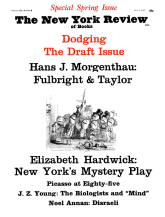In response to:
Dangerous Acquaintances from the February 23, 1967 issue
To the Editors:
Professor Meyer Schapiro in his review [NYR, Feb. 23] of Dr. Zeligs’s new book, Friendship and Fratricide, an Analysis of Whittaker Chambers and Alger Hiss, declares himself to have been “an old friend” of Whittaker Chambers. It is, of course, to Professor Schapiro’s credit that he makes this declaration in his review. It is regrettable, however, that you should have chosen to review a book on the Hiss-Chambers conflict, an old friend of one of the parties. For Professor Schapiro, as may sometimes befit an old friend, and as does not befit a reviewer, glosses over an important fact, central to the controversy about which he writes. Before the libel action, he says, Chambers “had avoided the imputation of espionage to the underground group.”
This will not do. Chambers did not just avoid an imputation. He denied, under oath, any knowledge of espionage. At the libel hearings he was cross examined about this by Hiss’s counsel and the following exchange took place:
Counsel: Then the fact is, is it not, that you were asked directly by the grand jury under oath whether there was any espionage, and you said you had no recollection?
Chambers: That is right.
Counsel: Was that answer true or false?
Chambers: That answer was false.
Counsel: Then you admit that you testified falsely and committed perjury before the grand jury in this building, is that right?
Chambers: That is right.
Alger Hiss was convicted of perjury on Chambers’s testimony, backed by some important material evidence (the typewriter). Mr. Hiss, having served his sentence, still denies the offense. Professor Schapiro has the right to reject that denial, as he does. There is, however, an important fact which tells in Mr. Hiss’s favor: that the man on whose testimony he was convicted of perjury was himself a self-confessed perjurer. To present the perjurer Chambers as a mere avoider of an imputation involves an injustice to Mr. Hiss.
Conor Cruise O’Brien
New York City
Meyer Schapiro replies:
The one detail that Professor Conor Cruise O’Brien selects to show my unfitness to review Dr. Zelig’s book is a passage on a point that is not at all, as he thinks, “central to the controversy” over Hiss’s innocence. Nor does it concern my judgment of the quality of the book as a psychoanalytic investigation. That Chambers, prior to the law suit, perjured himself in denying knowledge of espionage is a matter of record. My point was that without Hiss’s “unfortunate law suit the charge of espionage and the ensuing indictment for perjury would not have been made.” It was this libel suit that brought out the whole wretched story. Until then Chambers’s denial of espionage protected Hiss as well as Chambers. It has yet to be shown how Chambers’s confessed perjury—which is perjury only if one believes that he had in fact been a Communist spy—invalidates the “important material evidence” that Professor O’Brien admits led to Hiss’s conviction.
This Issue
April 6, 1967



